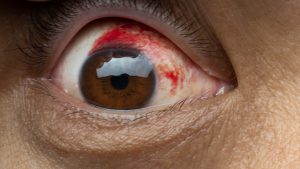 A subconjunctival hemorrhage occurs when a tiny blood vessel breaks underneath the clear surface of your eye called the conjunctiva.
A subconjunctival hemorrhage occurs when a tiny blood vessel breaks underneath the clear surface of your eye called the conjunctiva.
The most common sign/symptom of a subconjunctival hemorrhage is a bright red spot on the white of your eye.
The cause of a subconjunctival hemorrhage isn’t always known. However, some activities and health conditions can briefly raise the blood pressure in your veins causing the blood vessels in your eyes to break. These can include:
- Straining (during coughing, sneezing, vomiting, or while using the toilet)
- Injury to your head or eye, including an infection
- Lifting, pushing, or bending forward
- Rubbing your eye too hard
- Wearing contact lenses
- Taking medications, including blood thinners or certain cancer medications
Some less common subconjunctival hemorrhage causes include:
- Diabetes
- High blood pressure
- Blood-clotting disorders
A healthcare provider or eye care specialist can diagnose a subconjunctival hemorrhage by looking at your eye. Other tests may be needed if you have recurrent subconjunctival hemorrhages. Your healthcare provider may also:
- Ask questions about your general health and symptoms
- Conduct an eye examination
- Take your blood pressure
- Obtain a routine blood test to make sure you don’t have a potentially serious bleeding disorder
Treatment for a subconjunctival hemorrhage usually isn’t necessary even though it may look alarming. More often than not, it is a harmless condition that disappears within two weeks or less.
If you’re experiencing symptoms of a subconjunctival hemorrhage, you can schedule an appointment at Jamaica Hospital Medical Center’s Ophthalmology Center by calling (718) 206-5900.
All content of this newsletter is intended for general information purposes only and is not intended or implied to be a substitute for professional medical advice, diagnosis or treatment. Please consult a medical professional before adopting any of the suggestions on this page. You must never disregard professional medical advice or delay seeking medical treatment based upon any content of this newsletter. PROMPTLY CONSULT YOUR PHYSICIAN OR CALL 911 IF YOU BELIEVE YOU HAVE A MEDICAL EMERGENCY.
